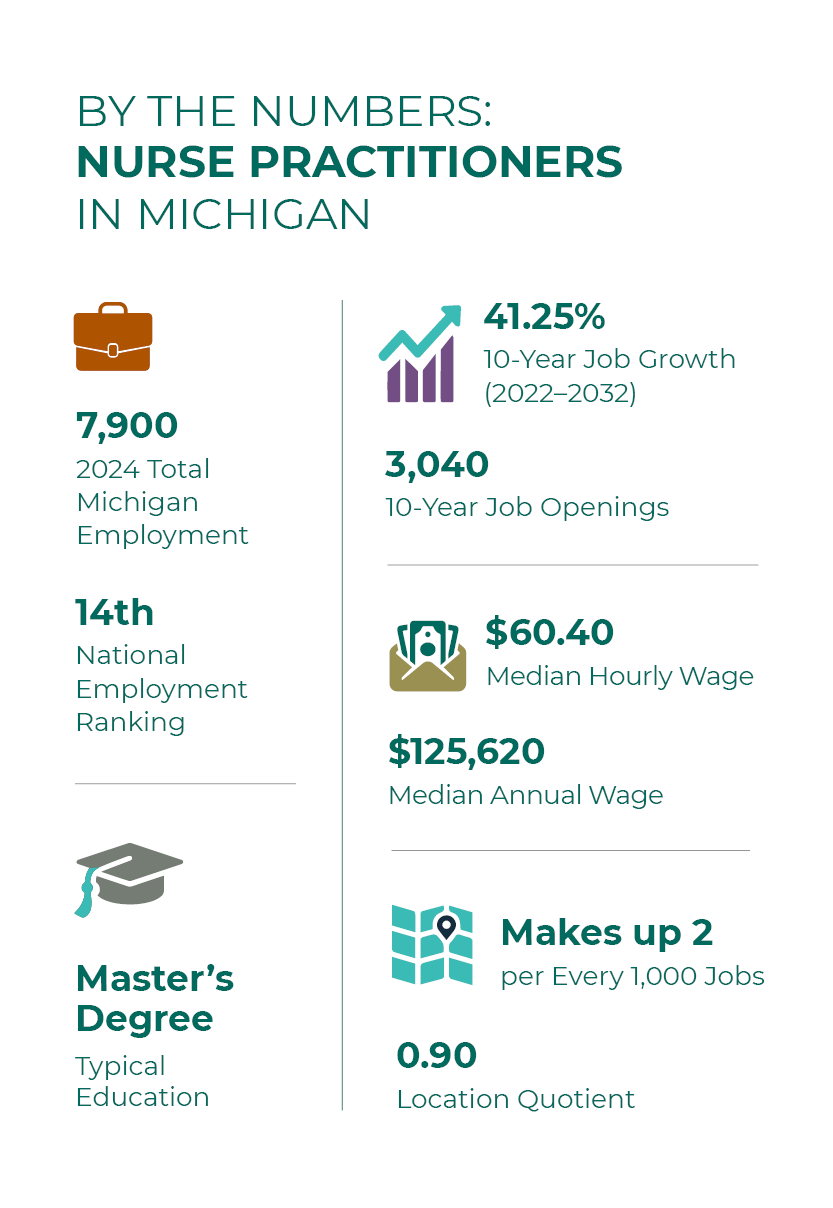The web Browser you are currently using is unsupported, and some features of this site may not work as intended. Please update to a modern browser such as Chrome, Firefox or Edge to experience all features Michigan.gov has to offer.
Occupational Focus: Nurse Practitioners
October 09, 2025
According to the U.S. Bureau of Labor Statistics, Nurse practitioners diagnose and treat acute, episodic, or chronic illnesses, independently or as part of a healthcare team. They may focus on health promotion and disease prevention, order, perform, or interpret diagnostic tests such as lab work and x-rays, and prescribe medication.
Employment and Wages
In 2024, there were approximately 7,900 Nurse practitioners in Michigan representing 0.2 percent of the state’s total employment. Nationally, this occupation accounted for 307,390 workers, also making up 0.2 percent of overall U.S. employment. The median hourly wage for Nurse practitioners in Michigan was $60.40 per hour, nearly three times higher than the statewide median of $23.22. Nationally, the median wage for this occupation was slightly higher at $62.12 per hour.
Common Job Titles
Jobs in this occupation include a variety of titles:
- Acute Care Nurse Practitioner (ACNP)
- Adult Nurse Practitioner
- Advanced Practice Registered Nurse (APRN)
- Family Nurse Practitioner (FNP)
- Pediatric Nurse Practitioner (PNP)
Job Responsibilities
- Maintaining complete and detailed records of patient health care plans and prognoses
- Developing treatment plans based on scientific rationale, standards of care, and professional practice guidelines
- Providing patients with information needed to promote health, reduce risk factors, or prevent disease or disability
- Analyzing and interpreting patient histories, symptoms, physical findings, or diagnostic information to develop appropriate diagnoses.
- Diagnosing or treating complex, unstable, comorbid, episodic, or emergency conditions in collaboration with other health care providers as necessary.
Education and Skills
Almost 90 percent of Nurse practitioners have obtained a master’s degree or higher, which is the typical education requirement for entry-level positions, though some specialized positions may require additional credentials. Essential skills include strong inductive reasoning, problem sensitivity, and written comprehension. The technology requirements frequently listed in job postings are communication and web-based tools, medical software (Epic Systems), presentation software, and spreadsheet software.
Most Related Occupations
- Advanced Practice Psychiatric Nurses
- Clinical Nurse Specialists
- Emergency Medicine Physicians
- Family Medicine Physicians
- Registered Nurses
Occupation Outlook
This occupation has one of the brightest outlooks in the state. The long-term projected growth rate from 2022 to 2032 is 41.2 percent, which is much higher than Michigan’s projected 0.6 percent growth rate for all occupations. Nurse practitioners are projected to have a total of 700 annual openings through 2032, mostly driven by an increase in the demand for healthcare services. Several factors will contribute to this demand, including an increased emphasis on preventive care and the growing healthcare needs of an aging population.

Source: Occupational Employment and Wage Statistics, U.S. Bureau of Labor Statistics; 2022–2032 Occupational Employment Projections, Michigan Center for Data and Analytics
Author: